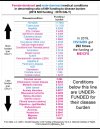Andy
Senior Member (Voting rights)
Background: Gender bias has been an ongoing issue in health care, examples being underrepresentation of women in health studies, trivialization of women's physical complaints, and discrimination in the awarding of research grants. We examine here a different issue—gender disparity when it comes to the allocation of research funding among diseases.
Materials and Methods: We perform an analysis of funding by the U.S. National Institutes of Health (NIH) to ascertain possible gender disparity in its allocation of funds across diseases. We normalize funding level to disease burden, as measured by the Disability Adjusted Life Year, and we specifically consider diseases for which both disease burden and funding level are provided. We apply a power-law regression analysis to model funding commensurate with disease burden.
Results: We find that in nearly three-quarters of the cases where a disease afflicts primarily one gender, the funding pattern favors males, in that either the disease affects more women and is underfunded (with respect to burden), or the disease affects more men and is overfunded. Moreover, the disparity between actual funding and that which is commensurate with burden is nearly twice as large for diseases that favor males versus those that favor females. A chi-square test yields a p-value of 0.015, suggesting that our conclusions are representative of the full NIH disease portfolio.
Conclusions: NIH applies a disproportionate share of its resources to diseases that affect primarily men, at the expense of those that affect primarily women.
Open access, https://www.liebertpub.com/doi/full/10.1089/jwh.2020.8682
"There is little in the published literature when it comes to gender disparity in the allocation of research funds among diseases. A recent study of the funding of 18 different types of cancers by the National Cancer Institute found that gynecologic cancers (ovarian, cervical, uterine) ranked 10th, 12th and 14th, respectively, in funding normalized to years of life lost, whereas prostate cancer ranked 1st.1 A study focusing on the disease myalgic encephalomyelitis/chronic fatigue syndrome (ME/CFS), ∼75% of whom afflicted are women,2 found that disease to be the lowest funded (relative to disease burden) in the National Institutes of Health (NIH) portfolio.3,4 In carrying out the ME/CFS study, it was observed that some of the lowest funded diseases relative to disease burden were ones that affect primarily women. We chose to examine this issue in greater depth, leading to the analysis reported herein."
Materials and Methods: We perform an analysis of funding by the U.S. National Institutes of Health (NIH) to ascertain possible gender disparity in its allocation of funds across diseases. We normalize funding level to disease burden, as measured by the Disability Adjusted Life Year, and we specifically consider diseases for which both disease burden and funding level are provided. We apply a power-law regression analysis to model funding commensurate with disease burden.
Results: We find that in nearly three-quarters of the cases where a disease afflicts primarily one gender, the funding pattern favors males, in that either the disease affects more women and is underfunded (with respect to burden), or the disease affects more men and is overfunded. Moreover, the disparity between actual funding and that which is commensurate with burden is nearly twice as large for diseases that favor males versus those that favor females. A chi-square test yields a p-value of 0.015, suggesting that our conclusions are representative of the full NIH disease portfolio.
Conclusions: NIH applies a disproportionate share of its resources to diseases that affect primarily men, at the expense of those that affect primarily women.
Open access, https://www.liebertpub.com/doi/full/10.1089/jwh.2020.8682
"There is little in the published literature when it comes to gender disparity in the allocation of research funds among diseases. A recent study of the funding of 18 different types of cancers by the National Cancer Institute found that gynecologic cancers (ovarian, cervical, uterine) ranked 10th, 12th and 14th, respectively, in funding normalized to years of life lost, whereas prostate cancer ranked 1st.1 A study focusing on the disease myalgic encephalomyelitis/chronic fatigue syndrome (ME/CFS), ∼75% of whom afflicted are women,2 found that disease to be the lowest funded (relative to disease burden) in the National Institutes of Health (NIH) portfolio.3,4 In carrying out the ME/CFS study, it was observed that some of the lowest funded diseases relative to disease burden were ones that affect primarily women. We chose to examine this issue in greater depth, leading to the analysis reported herein."



